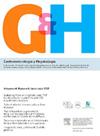Evaluación de la duración de la baja laboral en pacientes con enfermedad inflamatoria intestinal
IF 2.2
4区 医学
Q3 GASTROENTEROLOGY & HEPATOLOGY
引用次数: 0
Abstract
Introduction
Inflammatory bowel disease (IBD) is a chronic disorder that can lead to periods of work-related temporary disability (TD), which may result in the need for permanent disability. The objective was to assess the impact of IBD on patients’ temporary disability by analyzing periods, duration, and causes. It also investigates risk factors influencing the severity, frequency, and duration of flare-ups and associated complications in IBD patients.
Method
The study includes patients aged 18 to 65, with at least 1 day of TD in 2019 (Pre-COVID), referred or not by UMEVI, due to reasons related to IBD.
Results
A total of 172 patients were included, and in all cases, TD was associated with IBD. TD was higher in patients over 30 years old, with anxious depressive disorder, who required hospitalization and did not receive prednisone treatment (p < 0.05). TD duration was longer in patients belonging to the Special Regime for Self-Employed Workers (RETA): 67 days (IQR: 22-160) versus the General Regime (RG): 33 days (IQR: 8-110), with no statistically significant difference (p = 0.120). The mean cost (€) per worker in this series was €745.5 (IQR: 231-2608.2).
Conclusions
IBD has a significant impact on patients’ temporary work disability. The duration of TD was longer in patients older than 30 years, with anxious-depressive disorder, who required hospital admission and did not receive steroid treatment.
评估炎症性肠病患者的病假时间。
导言:炎症性肠病(IBD)是一种慢性疾病,可导致与工作相关的暂时性残疾(TD),并可能导致永久性残疾。本研究旨在通过分析IBD对患者暂时性残疾的影响、持续时间和原因,评估IBD对患者暂时性残疾的影响。研究还调查了影响 IBD 患者病情发作的严重程度、频率和持续时间以及相关并发症的风险因素:研究对象包括年龄在18至65岁之间,在2019年(Pre-COVID)至少有1天TD的患者,无论是否由UMEVI转诊,原因均与IBD有关:共纳入172名患者,在所有病例中,TD均与IBD有关。30岁以上、患有焦虑抑郁症、需要住院治疗且未接受泼尼松治疗的患者中,TD的发病率较高:IBD 对患者的暂时性工作残疾有很大影响。年龄在30岁以上、患有焦虑抑郁症、需要住院治疗且未接受类固醇治疗的患者的暂时丧失工作能力持续时间较长。
本文章由计算机程序翻译,如有差异,请以英文原文为准。
求助全文
约1分钟内获得全文
求助全文
来源期刊

Gastroenterologia y hepatologia
GASTROENTEROLOGY & HEPATOLOGY-
CiteScore
1.50
自引率
10.50%
发文量
147
审稿时长
48 days
期刊介绍:
Gastroenterology and Hepatology is the first journal to cover the latest advances in pathology of the gastrointestinal tract, liver, pancreas, and bile ducts, making it an indispensable tool for gastroenterologists, hepatologists, internists and general practitioners.
 求助内容:
求助内容: 应助结果提醒方式:
应助结果提醒方式:


